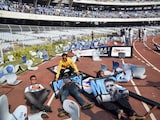Indian-origin astronaut Sunita Williams rocketed into space creating history as the first woman to test a spacecraft on its maiden mission, which she incidentally helped design over the last decade. Ms Williams overflew India on her way to space.
She lifted off onboard Boeing's Starliner spacecraft on the Atlas 5 rocket at 8:22 pm (IST) from the Space Launch Complex-41 at Cape Canaveral Space Force Station in Florida. This is her third space flight.
The lift-off happened on the third attempt and was nominal. The Starliner got the correct orbit and will dock with the International Space Station a day later. Today, the US has three crewed spacecraft simultaneously in orbit - the Boeing Starliner, the SpaceX Crew Dragon, and the International Space Station.
NASA says if all goes well the Starliner will dock to the forward-facing port of the station's Harmony module and Ms Williams and her co-passenger Butch Wilmore will remain at the space station for about a week to test the spacecraft and its subsystems before NASA works to complete the final certification of the transportation system for rotational missions to the orbiting laboratory as part of its Commercial Crew Program.
The Starliner has been designed for astronauts by astronauts and is the most modern crew module ever to be flown, NASA said.
Ms Williams, a poster girl for women aspiring to fly into space, flew into the skies in a brand-new spacecraft.
Earlier, the Indian-origin astronaut had spent 322 days in space and held a record for the maximum hours of spacewalk by a woman, before being overtaken by Peggy Whitson.
This time, she makes history as the first woman to fly on a maiden crewed mission of a new space shuttle.
The 59-year-old admitted to being a bit nervous but said she had no jitters about flying in a new spacecraft that she helped design with engineers from NASA and Boeing. "When I reach the International Space Station, it will be like going back home," she said.
The nearly 10-day mission will help the Starliner prove its space-worthiness. It would also prove the team's readiness to get a NASA certification and fly long-duration missions for the US space agency.
The Starliner is much behind schedule and way over the budget, with some saying that the problems plaguing Boeing in its aviation business may be spilling into its space business.
In 2014 NASA awarded a $4.2 billion contract for its making from scratch and ten years later it has not seen even a single successful human space flight. In contrast, Space X which was given a similar contract for the development of Crew Dragon was delivered at an estimated cost of $2.6 billion. SpaceX is already ferrying astronauts to the ISS using its crew module.















